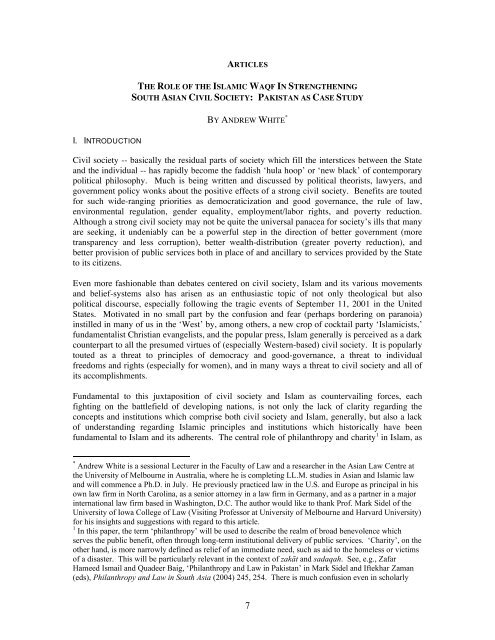Volume IV, Issue II (April 2006) - Columbus School of Law
Volume IV, Issue II (April 2006) - Columbus School of Law
Volume IV, Issue II (April 2006) - Columbus School of Law
Create successful ePaper yourself
Turn your PDF publications into a flip-book with our unique Google optimized e-Paper software.
ARTICLESTHE ROLE OF THE ISLAMIC WAQF IN STRENGTHENINGSOUTH ASIAN C<strong>IV</strong>IL SOCIETY: PAKISTAN AS CASE STUDYBY ANDREW WHITE *I. INTRODUCTIONCivil society -- basically the residual parts <strong>of</strong> society which fill the interstices between the Stateand the individual -- has rapidly become the faddish ‘hula hoop’ or ‘new black’ <strong>of</strong> contemporarypolitical philosophy. Much is being written and discussed by political theorists, lawyers, andgovernment policy wonks about the positive effects <strong>of</strong> a strong civil society. Benefits are toutedfor such wide-ranging priorities as democraticization and good governance, the rule <strong>of</strong> law,environmental regulation, gender equality, employment/labor rights, and poverty reduction.Although a strong civil society may not be quite the universal panacea for society’s ills that manyare seeking, it undeniably can be a powerful step in the direction <strong>of</strong> better government (moretransparency and less corruption), better wealth-distribution (greater poverty reduction), andbetter provision <strong>of</strong> public services both in place <strong>of</strong> and ancillary to services provided by the Stateto its citizens.Even more fashionable than debates centered on civil society, Islam and its various movementsand belief-systems also has arisen as an enthusiastic topic <strong>of</strong> not only theological but alsopolitical discourse, especially following the tragic events <strong>of</strong> September 11, 2001 in the UnitedStates. Motivated in no small part by the confusion and fear (perhaps bordering on paranoia)instilled in many <strong>of</strong> us in the ‘West’ by, among others, a new crop <strong>of</strong> cocktail party ‘Islamicists,’fundamentalist Christian evangelists, and the popular press, Islam generally is perceived as a darkcounterpart to all the presumed virtues <strong>of</strong> (especially Western-based) civil society. It is popularlytouted as a threat to principles <strong>of</strong> democracy and good-governance, a threat to individualfreedoms and rights (especially for women), and in many ways a threat to civil society and all <strong>of</strong>its accomplishments.Fundamental to this juxtaposition <strong>of</strong> civil society and Islam as countervailing forces, eachfighting on the battlefield <strong>of</strong> developing nations, is not only the lack <strong>of</strong> clarity regarding theconcepts and institutions which comprise both civil society and Islam, generally, but also a lack<strong>of</strong> understanding regarding Islamic principles and institutions which historically have beenfundamental to Islam and its adherents. The central role <strong>of</strong> philanthropy and charity 1 in Islam, as* Andrew White is a sessional Lecturer in the Faculty <strong>of</strong> <strong>Law</strong> and a researcher in the Asian <strong>Law</strong> Centre atthe University <strong>of</strong> Melbourne in Australia, where he is completing LL.M. studies in Asian and Islamic lawand will commence a Ph.D. in July. He previously practiced law in the U.S. and Europe as principal in hisown law firm in North Carolina, as a senior attorney in a law firm in Germany, and as a partner in a majorinternational law firm based in Washington, D.C. The author would like to thank Pr<strong>of</strong>. Mark Sidel <strong>of</strong> theUniversity <strong>of</strong> Iowa College <strong>of</strong> <strong>Law</strong> (Visiting Pr<strong>of</strong>essor at University <strong>of</strong> Melbourne and Harvard University)for his insights and suggestions with regard to this article.1 In this paper, the term ‘philanthropy’ will be used to describe the realm <strong>of</strong> broad benevolence whichserves the public benefit, <strong>of</strong>ten through long-term institutional delivery <strong>of</strong> public services. ‘Charity’, on theother hand, is more narrowly defined as relief <strong>of</strong> an immediate need, such as aid to the homeless or victims<strong>of</strong> a disaster. This will be particularly relevant in the context <strong>of</strong> zakāt and sadaqah. See, e.g., ZafarHameed Ismail and Quadeer Baig, ‘Philanthropy and <strong>Law</strong> in Pakistan’ in Mark Sidel and Iftekhar Zaman(eds), Philanthropy and <strong>Law</strong> in South Asia (2004) 245, 254. There is much confusion even in scholarly7
















